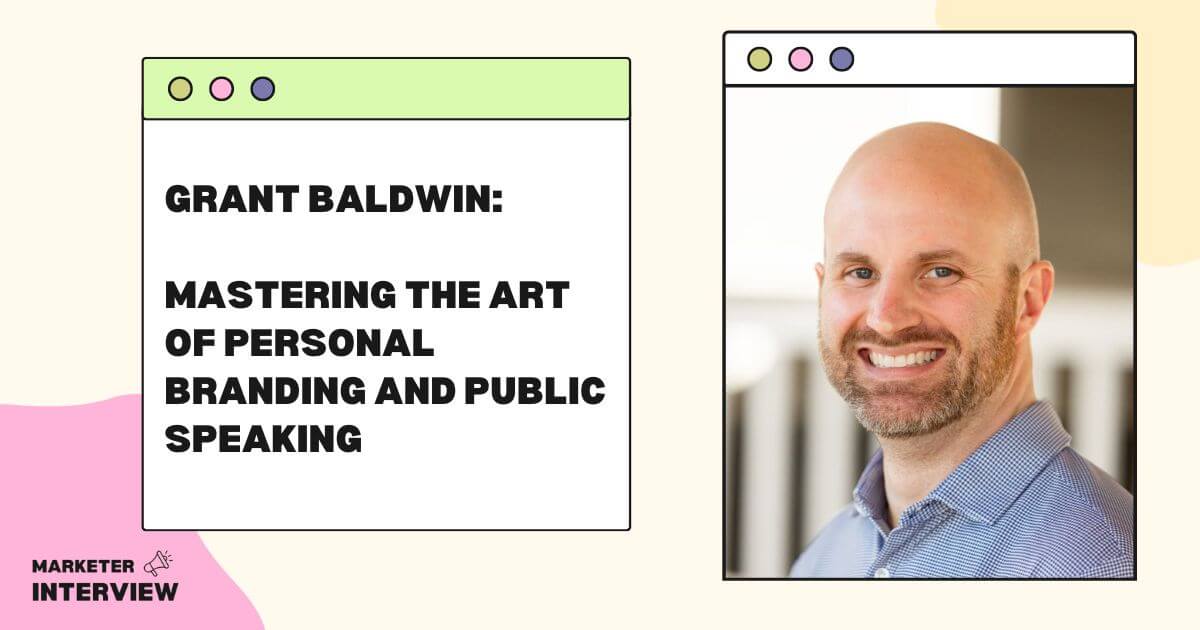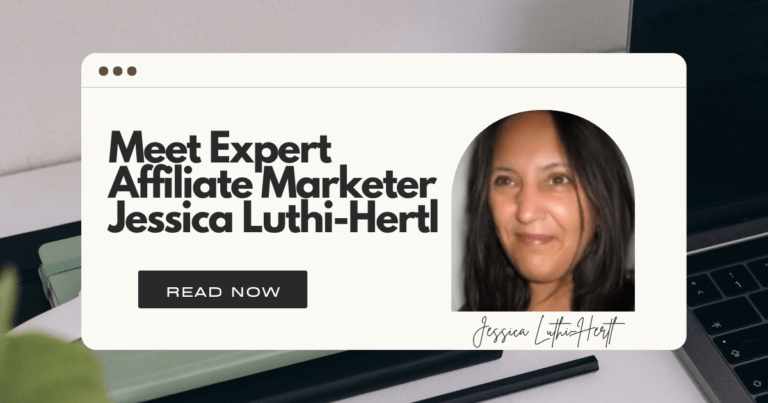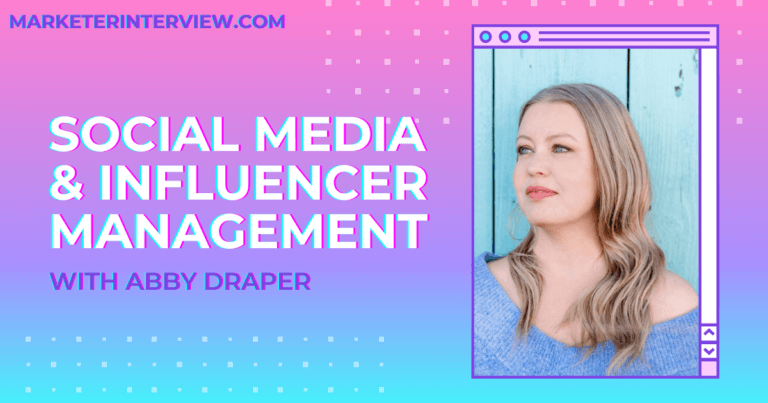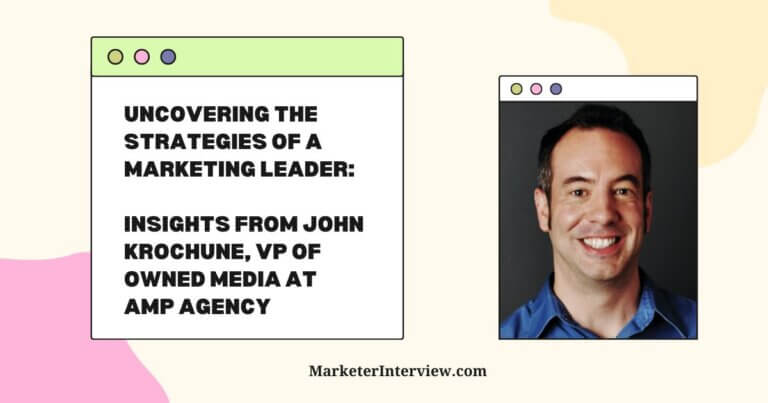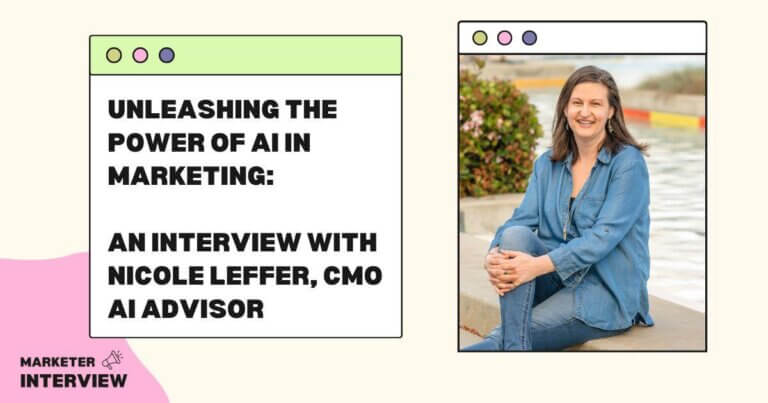Grant Baldwin: Mastering the Art of Personal Branding and Public Speaking
Welcome to Marketer Interview, where we delve into the minds of exceptional marketers and uncover the secrets behind their success.
In this edition, we have the privilege of speaking with Grant Baldwin, the Founder and CEO of The Speaker Lab.
Grant has achieved remarkable feats in the world of public speaking, earning over $2 million from 500+ paid engagements across the globe. His journey is even more impressive, considering he accomplished all this without relying on traditional booking agents or speaker bureaus.
His passion for helping aspiring speakers led him to establish The Speaker Lab in 2015, offering invaluable resources and insights to those seeking to make an impact in the speaking industry.
Now, let’s uncover Grant’s valuable experiences, strategies, and advice for aspiring marketers and speakers.
Contents
- 1 Can you share your journey of entering the marketing world and, specifically, the speaking industry?
- 2 What inspired you to create a personal brand as a speaker, and how did you build it from scratch?
- 3 Building a personal website is crucial for speakers. What key elements and strategies should one focus on while creating a compelling speaker website?
- 4 When marketing your brand as a speaker, what are the most effective strategies you’ve found for utilizing email campaigns?
- 5 Social media has become a powerful tool for personal branding. Which platforms have you found most beneficial, and what approaches have yielded the best results?
- 6 Developing an engaging and impactful website is essential. Could you share some insights on how to optimize a speaker’s website for maximum impact and conversions?
- 7 In your experience, what are the biggest challenges aspiring speakers face when marketing their personal brands, and how can they overcome them?
- 8 How do you leverage content marketing to enhance your brand as a speaker?
- 9 What tools and software do you rely on to streamline your work and maximize your productivity as a speaker and entrepreneur?
When I was newly married, I quit my job as a youth pastor because I wanted to be a speaker.
The problem? I had a newborn, no insurance, and no idea how to start a speaking business. Everybody I knew thought I was crazy, and you’re probably thinking the same thing right now.
Fortunately, my wife Sheila believed in me, and her steadfast support helped me persevere through those first few years of working odd jobs (including an eBay business selling designer handbags) while getting in front of every audience I could.
Eventually, I figured out a repeatable strategy for finding leads, marketing myself, and booking paid gigs. That’s why I started a podcast called The Speaker Lab, where I interview other speakers who used the same time-tested roadmap to speaking success.
The Speaker Lab podcast will be hitting its 500th episode next year and has grown into a business offering free resources, webinars, and coaching programs for anybody who wants to get booked and paid to speak.
What inspired you to create a personal brand as a speaker, and how did you build it from scratch?
When you’re a speaker, you are the brand. Not your company, not your speech, not your signature outfit. It’s You!
The key to succeeding in an industry where the brand is you? Clarity.
Don’t be fooled by the fancy stunts you see well-established speakers pull. That’s not how you start building a brand. You have to tell a simple story through in-person and online interactions that communicate who you are, what you do, and whom you serve.
One of the earliest concrete steps I took toward a personal brand: Registering the website domain Grantbaldwin.com to connect my speaking expertise to my person from the beginning.
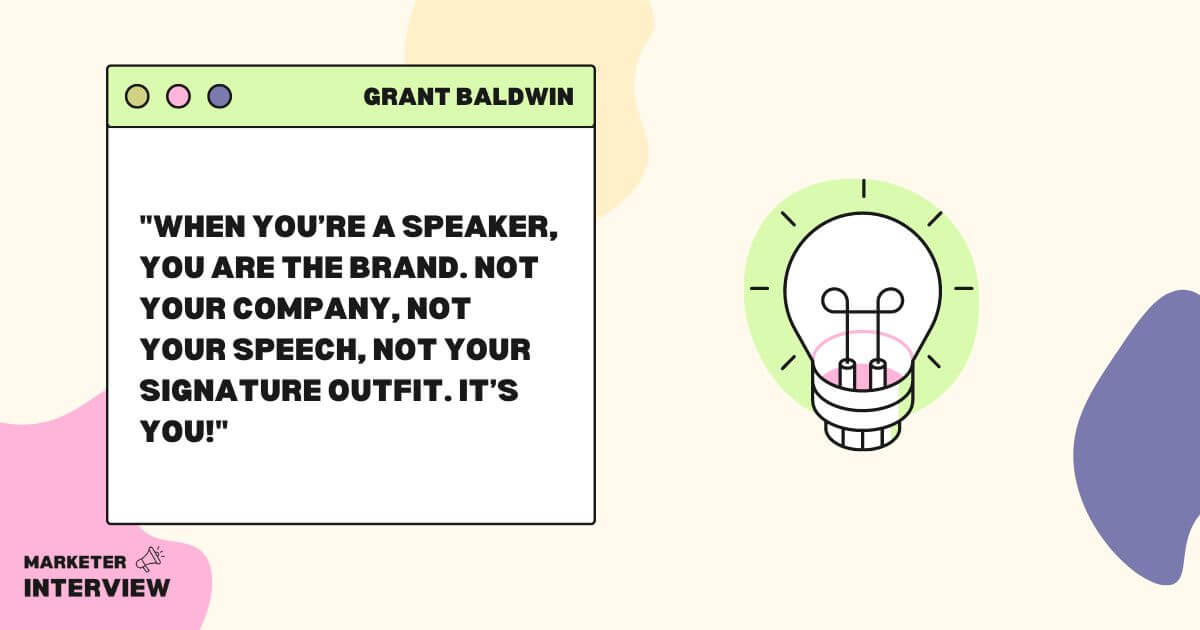
Building a personal website is crucial for speakers. What key elements and strategies should one focus on while creating a compelling speaker website?
Don’t fill your website with unnecessary elements, over-inflate what you do, or try to appeal to too many people. A short demo video, a bio page with a headshot and personality pics, contact information or a contact form, glowing testimonials from prior clients, and a sampling of your speaking topics are all you need.
Regarding strategy, it all comes down to remembering that the proper audience for your website isn’t the same as your speaking audience. Rather, your website should primarily appeal to the event planners hiring you.
When marketing your brand as a speaker, what are the most effective strategies you’ve found for utilizing email campaigns?
Email marketing is still one of the best ways to connect with decision-makers for events.
I have a great set of email templates I used to get hundreds of gigs on our website, but here’s one main tip: Don’t just mass spam a bunch of people. When possible, include the first name in your greeting. Also, any time you can add 1-2 personal lines, do it.
For example, if you see in your contact’s bio they have the same number of kids as you, grew up in the same area, and are fans of the same teams…those types of things I’ll point out. Remember, this is a relationship business, and your goal is to connect with the other person on a human level.
Social media has become a powerful tool for personal branding. Which platforms have you found most beneficial, and what approaches have yielded the best results?
It’s no secret that many speakers, event planners, and industry experts congregate on LinkedIn. I like to use LinkedIn for thought leadership – sharing speaking tips, highlighting our incredible podcast guests, and engaging with other speakers and our TSL students.
Showing the human side of your business is important for establishing a strong brand too, which is why you can find me on Instagram talking about my travel escapades, my wonderful wife and daughters, my great team at The Speaker Lab, and whatever else I’m up to.
Putting a 2-3 minute demo video (with live footage of you speaking onstage, not just talking at a camera) front and center will always make the biggest impact on clients.
Equally important: make it easy to get in touch. If a potential client is impressed but has to navigate to another page for a contact form, you could easily lose them. Your demo video with an email address or contact form below is the first thing anyone sees on your website.
In your experience, what are the biggest challenges aspiring speakers face when marketing their personal brands, and how can they overcome them?
Getting over the hump of selling yourself is difficult, even if you’re used to selling things for a living! Many aspiring speakers treat speaking like a hobby, or a secret, something they do on the side but don’t talk about daily.
But good speaker branding comes down to being the same person onstage as you are offstage, meaning you must get out there and tell people you’re a speaker. This will help you build a strong network that will continue marketing your speaking business through word of mouth without any extra effort. You never know if your great-aunt’s pickleball partner or co-worker’s sister-in-law happens to be hiring a speaker!

How do you leverage content marketing to enhance your brand as a speaker?
The best way to succeed as a thought leader is to put most of your efforts into one or two channels where you can excel.
I started with content marketing through my podcast, which is still my favorite way to share my expertise and that of others with a broad audience. After establishing myself in the speaking and podcasting space, I wrote a book, The Successful Speaker, where I share my speaker success roadmap. And I’ve found LinkedIn to be a great place to share tips other speakers share with me and lessons learned from my career.
What tools and software do you rely on to streamline your work and maximize your productivity as a speaker and entrepreneur?
Putting Systems In Place (SIP, like a sip of coffee) is essential to launching a sustainable business of any kind, speaking included.
When you start, sometimes you need an Excel spreadsheet, but I recommend a few software tools as you get ready to scale. They include reminders or automation for follow-up emails (e.g., Boomerang), a CRM for managing your client pipeline (e.g., Hubspot), a travel planner (e.g., TripIt), and a calendar manager (e.g., Mixmax).
